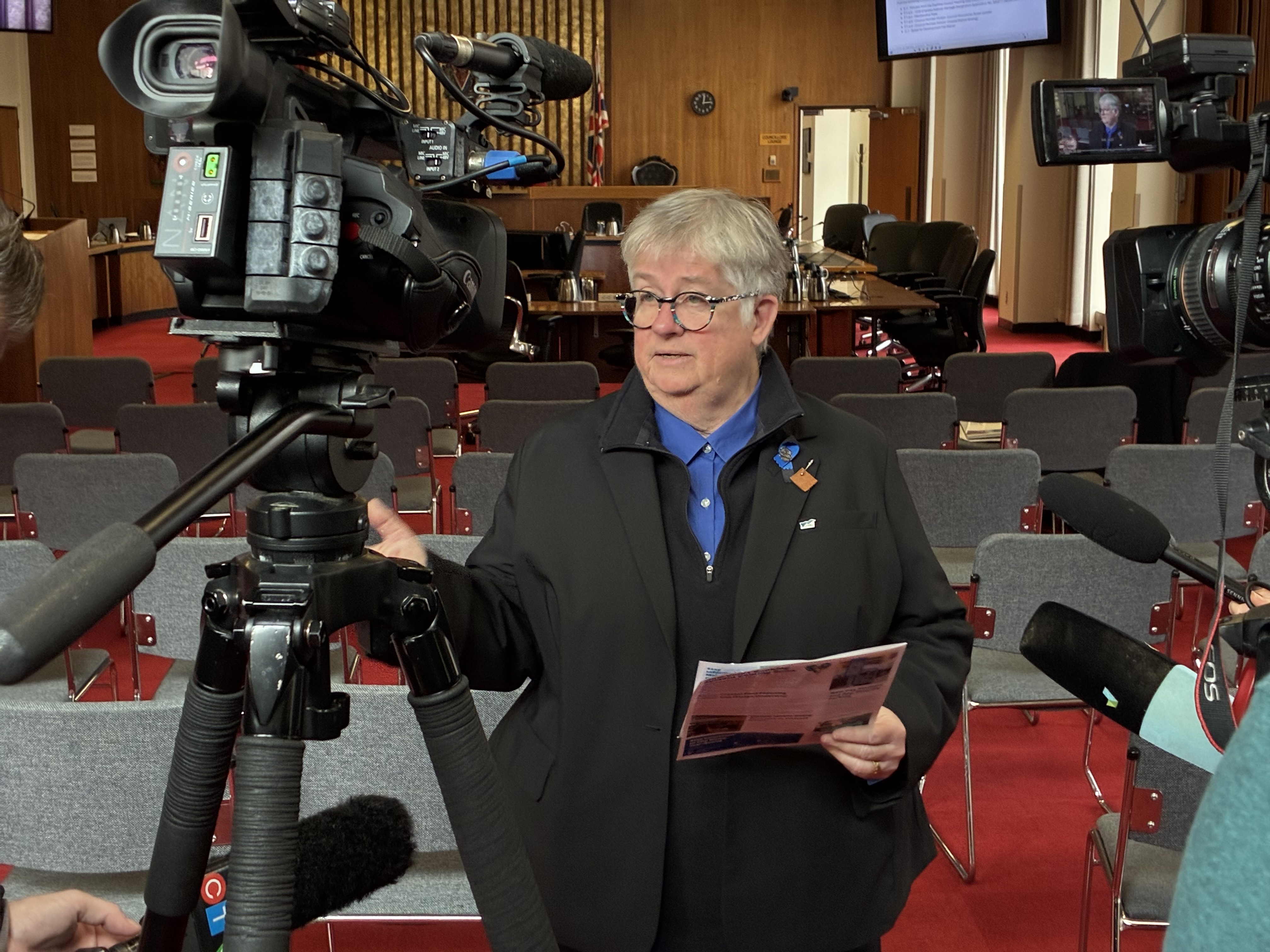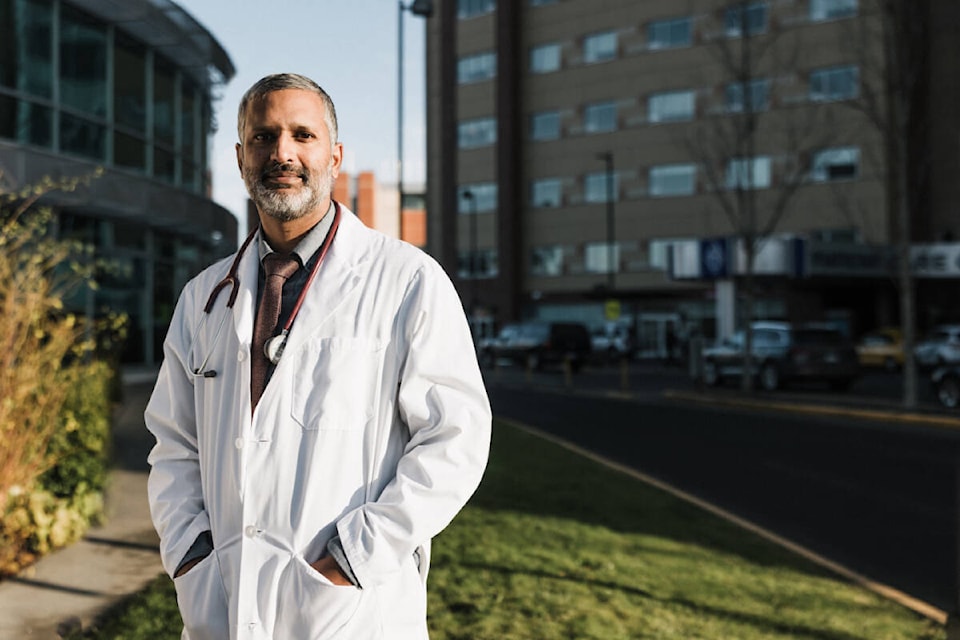Heather Adams has been living with a debilitating eating disorder for most of her life. It began when she was around 13 and is something she lives with to this day. But it wasn’t until just three years ago, at the age of 41, that she sought help.
“Up until that point, I thought—and the impression that I had been given by those around me was—that it was a choice,” Adams said. “This is an illness, no different than if somebody was living with cancer.”
Her story is all too familiar for many adults with eating disorders who, growing up, believed their illness was self-inflicted. Adams decided to seek treatment at the insistence of her two daughters, and checked herself into an out-of-province private treatment facility.
“I can look back now and see that I did need hospitalization at that point but at the time, there was a lot of denial, there’s a lot of avoidance,” she said.
Adams spent seven weeks and about $35,000 on that private program, but after coming out of residential care, she realized her own need for ongoing therapy and support. That’s when her family doctor referred her to the South Island Eating Disorder clinic.
That clinic, she would come to realize, was facing a tough choice: as more people were referred to its services, it was becoming less and less able to meet their needs. The problem is compounded by a lack of staff who can handle the complex care eating disorder patients need.
Now patients like Adams are at a loss for where they’ll go next, as the facility makes painful cutbacks.
This clinic on Jutland Road is the only facility in the south Island region that could refer her to the inpatient treatment program at St. Paul’s Hospital in Vancouver. While waiting for the clinic to accept her—a process that can take up to six months—Adams was able to access regular one-on-one psychiatric counselling, meetings with a dietician, and group therapy sessions through the ED clinic in Victoria.
“[My eating disorder] was something I thought I had hidden for 30 years,” Adams said. At the clinic, she was surrounded by clinicians and patients who knew what she had gone through. “It was a huge piece of my recovery.”
The South Island Eating Disorder clinic services both children and adults, but falls under the jurisdiction of the Ministry of Children and Family Development (MCFD)—making it the only ED program in the province not overseen by the Ministry of Health. According to an emailed statement from the MCFD, over 250 adults are currently enrolled in the program.
Come January 2022, the clinic will temporarily stop accepting adults into the program unless in an emergency, and those currently in the program or waiting for intake will have access to far fewer services than before. There is no timeline provided for when these services and new adult patient intakes are expected to resume.
According to the MCFD, these cutbacks are a result of increased demand: because more people are being referred to the South Island ED clinic during the pandemic, there aren’t enough health-care workers to accommodate their needs.
“Specialized clinicians are difficult to recruit and we have been successful to recruit one clinician. However, we are actively continuing to recruit for this skill set that is in significant demand,” reads an emailed statement from a ministry spokesperson.
No other options
At the moment, the clinic offers need-based, one-on-one consultations with a clinical counsellor who is familiar with eating disorders, meetings with a dietician, and different types of group therapy sessions.
“For example, there was a self compassion group that was really helpful that I took,” said Sara Maksymowicz, a patient who was diagnosed with anorexia nervosa at age 38 but has lived with her eating disorder since she was a toddler. “There were also other workshops throughout the year, like a Christmas workshop, where we brainstorm coping techniques to use when we're dealing with holiday meal times and parties and stuff like that.”
Come January, all of those services will be gone. In their place, the clinic will be offering monthly check-ins with a case manager and group therapy classes that focus on nutrition—where plastic food is presented on a table and patients are shown different combinations of meals they can make out of them.
According to both Maksymowicz and Adams, these group sessions are not enough.
“To give a bit of background, I was a fitness instructor. I've created meal plans for people and supported people, and I mean, I can talk about that till I'm blue in the face and I can still then go home and actively engage in my eating disorder,” Adams said. “For an hour [in the nutrition group] to have this discussion and explain and identify what needs to be eaten is fine; it’s the actual support and the follow through of having somebody there to support you while you're struggling [that is needed]… there’s no comparison that you could get that care in a group.”
Those who are currently enrolled in the South Island ED program started hearing rumours about these upcoming service cuts in late October.
“I found out on social media through a private [Facebook] recovery group,” Maksymowicz said. “Some case managers were informing some clients and there [was] vague and conflicting information, so there were lots of rumours which caused a lot of fear and anxiety in our community.”
She and others only found out details of the program cuts after they reached out to their case managers for confirmation.
Maksymowicz herself has been hospitalized multiple times, and spent six months at a recovery facility in Vancouver this year after being referred through the South Island ED clinic.
Through the Vancouver program, she has access to another six months of regular counselling via Zoom. When those six months are up in February, the only place to turn to for ongoing therapy and support is the South Island ED clinic.
The alternative to services that were once provided by the ED clinic is to go the private route, but even basic, non-specialized therapy sessions are often inaccessible due to cost and many, like Maksymowicz, have already lost access to their psychiatrist through the Victoria Mental Health Centre—overseen by Island Health—due to staffing shortages.
“My private therapist costs $130 an hour, and my insurance company tops out at $600 of counselling,” Maksymowicz said. “I don't know how many sessions I'm going to be able to afford; I may have to stretch it out to once a month.”
For her, the South Island clinic is the only option for outpatient and ongoing specialized care.
South Island clinic left out of government funding
Back in June 2021, the provincial Ministry of Mental Health and Addictions made an announcement that gave south Island ED patients some hope: the promise of $6.6 million over three years to improve eating disorder treatment and services across BC.
Out of that $6.6 million, Island Health received $1.2 million in instalments of $400,000 each year for three years. But it quickly became clear that none of that money was going to the South Island clinic, which is the only program that offers any government-funded eating disorder services to Island residents south of the Malahat .
“Island Health is using the funding to enhance regional community-based eating disorder services in the central island and Cowichan Valley regions,” a spokesperson for the health authority said in an emailed statement to Capital Daily. “The main focus of these investments will be services for adults.”
The health authority is currently in the process of hiring a regional coordinator who will be based in the central Island region. Once they are hired, the coordinator will be responsible for building the program.
The reason why none of that funding was given to the South Island clinic is because it falls under the purview of the MCFD and Island Health does not have the jurisdiction to direct funding from other ministries their way.
The decision to keep the South Island clinic under MCFD’s purview—and even locate the clinic in the same office as the ministry—was made in 1997. When asked why, the MCFD did not answer the question and instead simply stated that the clinic offers “services to children, youth and adults, ensuring a seamless transition when youth turned 19.”
This situation is unique compared to other ED programs across BC, but when it comes to scaling back services, the South Island program does seem to take its cues from other jurisdictions.
Back in January 2018, Interior Health’s eating disorder program drastically scaled back one-on-one meetings with the psychiatrist and reduced individual therapy to a monthly or quarterly basis after they saw the number of referrals more than double in 2017.
Emails from the team leader of the South Island ED program to their counterpart in Kelowna show that the Island program sought advice from Interior Health on how to transition from offering one-on-one services to “all group treatment services.”
“[The changes were] just based on some changes that the clinic in the Interior had made, so it wasn't evidence-based as far as I could tell,” said Shaely Ritchey, one of the main coordinators of a non-profit peer support group called Vancouver Island Voices for Eating Disorders (VIVED), who obtained those emails by filing a freedom of information request. “This time, it's purely just lack of staffing and lack of funding.”
The team leader of the South Island ED program did not respond to our request for an interview.
Lack of information
Like many other illnesses that have quietly grown in prevalence during the pandemic, eating disorders have been impacting more and more people over the past two years. But even before COVID-19, it was difficult to get an exact sense of how many people live with and are impacted by eating disorders in Canada.
The latest available statistics, made public in a 2014 federal committee report, are from 2006 and found that 0.5% of Canadians aged 15 and older had been diagnosed with an eating disorder in the previous 12 months, and 1.5% had symptoms that met the criteria for an “eating attitude problem.” The committee found that about 150,000 Canadians have or have had anorexia nervosa, and approximately 300,000 have been diagnosed with bulimia.
The report itself comes with a caveat: these statistics only represent people who have sought out medical intervention and the actual number of people who live with eating disorders is likely to be much higher. Globally, according to a peer-reviewed meta-analysis of 36 studies, at least 9% of the population lives with an eating disorder and over 10,000 people die as a result of their illness or related comorbidities every year.
There is currently no available data for how many people have died due to an eating disorder or related comorbidity on Vancouver Island or across BC in any given year. In fact, a spokesperson for the BC Coroners Service said this is the first time they have even been asked for that information.
There are also no official statistics available to tell us what percentage of the population in the south Island region suffers from an eating disorder, but anecdotally, we know that the situation has rapidly worsened during the pandemic.
Ritchey says she has visited St. Paul’s hospital multiple times and found the majority of the seven beds reserved for eating disorder patients occupied by Island residents.
“The staff have also said, ‘Yes, we've seen a huge increase,’ but I don't have the actual numbers,” Ritchey said. Members of the eating disorder care team at St. Paul’s hospital either declined or did not respond to requests for an interview with Capital Daily.
Through VIVED, Ritchey has heard from a number of people who were distraught when they heard the news about the program cutting back.
“I think this is going to mean that a lot more people are going to get sicker and suffer for longer, and it'll be more difficult for them to actually get the help they need,” Ritchey said. “I do think we're going to see the number of hospital admissions go up. And we're going to see the number of deaths go up—a lot of deaths from eating disorders are actually due to suicide.”
Falling under the radar
While the MCFD maintains that a spike in the number of patients is the only reason for cutbacks in services, sources within the program say it’s also because multiple staff members quit their jobs at the clinic during the pandemic. One of them is Dr. Nicole Little, a registered clinical counsellor who worked at the South Island ED clinic for 13 years before deciding to leave in May 2021.
In an interview with Capital Daily, Little said she has seen the MCFD make a concerted effort to hire more staff to meet the clinic’s demands. When asked why she left, she said it was to pursue other opportunities. She also declined to comment on cuts to adult services that were made in 2019.
“I'm so tempted to say much more, but it is difficult to recruit people who have expertise and a willingness and passion to work with these folks, because eating disorders are complicated,” Little said. “They have physical side effects, they have mental health challenges, [and] they have lots of comorbidities.”
She also noted that provincial pay rates for these positions are uniform across the province, and speculates that Victoria being a more expensive city than most others in BC might also act as a barrier for clinicians to take the post here.
Regardless of the reasons behind the service cuts, Little says this move will lead to a “double barrel crisis”: ED patients’ disorders will worsen without treatment, and so will the comorbidities associated with them. From her own observations, she says not only have there been more people diagnosed with eating disorders during the pandemic, but the number of adults who were in recovery and experienced a relapse also increased.
Eating disorders were highlighted as a serious problem in mainstream culture in the ’80s and ’90s but, Little says, there may be an incorrect assumption that they are no longer as prevalent.
“I think there's certain organizations locally and provincially that have really worked towards reducing stigma and also trying to raise awareness. But—this is just my opinion—eating disorders often fall under the radar,” Little said. “I think there [are] still a lot of stereotypes about what eating disorders are and who gets them, and as a result, I don't think a lot of people always get [diagnosed].”
For Maksymowicz, the lack of general awareness about eating disorders and the dearth of services available in the south Island region means that she can no longer stay silent.
“I don't personally feel like I want to be interviewed by news media, or have to advocate for myself, or have to fight for services for others… but we are dying silently and no one is helping us.”










.jpeg)






